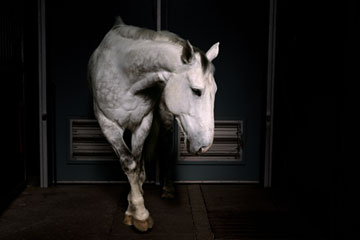
Horses can lapse into apparent depression when they lose a companion.
(4 of 6)
It defies science to say with certainty that the chimp closest to Oortje knew that death was coming, but it defies intuitive observation to say otherwise. "The death of Oortje and of the snake suggest that death of others is on the minds of primates and affects them deeply," says de Waal. "Evidence suggests that they know that once an individual has become immobile for a length of time, hope for revival is dim indeed."
Just Say No
Dim hope is not the same as no hope, and humans exhibit a desperate denial of death all the time. Family members in emergency rooms implore doctors to keep heart-shocking and chest-pounding accident victims long after life functions have quit. Psychics and Ouija-board makers owe their livings to our stubborn refusal to accept the dead-is-dead dictum. Religion, too, is a reflection of that. There's a lot more to the study of divinity and the deep faith of believers than just a desire for eternal life, but that's still part of religion's appeal.
Among animals, this behavior seems best expressed in the strange practice of corpse carrying. Chimps, bonobos and baboons carry their dead babies even after the telltale smell of decomposition--to which animals are usually well attuned--has begun and the babies have started to mummify in their hands. It's maladaptive in the extreme to trudge through a jungle where predators lurk carrying several pounds of what is literally dead weight, and yet mothers take the risk and expend the calories all the same. In one case in Guinea, a mother carried her baby for an astonishing 68 days.
"We see this a lot," says Vanessa Woods, research scientist and author of Bonobo Handshake, who worked at a 75-acre (30 hectare) bonobo sanctuary outside Kinshasa in the Democratic Republic of Congo. "Mothers not only carry dead babies; they're very careful with them. Human mothers who stop breast-feeding early have a higher risk of depression, so maybe something similar happens with bonobos when a baby dies."
King's book tells similarly poignant tales of grief and denial across the animal kingdom: There's Willa, the Siamese cat that spent her days wandering from room to room in her home, visiting and revisiting the places her recently deceased sister Carson used to be found. There's Hachiko, Japan's legendary Akita whose grieving appeared to extend across species lines. Hachiko accompanied his owner to a Tokyo train station each morning to see him off for work and then returned in the evening to greet him. When the owner died, the dog maintained his vigil, going to the station day after day for a decade--and always plodding home alone. There are horses that lapse into apparent depression after a companion dies and even a rabbit that, after its cagemate died, "spent about a week doing tragic sweeps of the house, searching for her," according to its owner.
